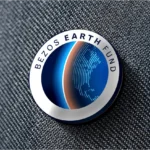- Global science-backed breeding: New initiative to screen 100K+ animals for natural, low-methane traits across cattle and sheep.
- Worldwide scale: Grants fund research across North America, Latin America, Europe, Africa, and Oceania.
- Significant climate payoff: Could cut livestock methane emissions by up to 30% over 20 years—without changing farming methods.
The Bezos Earth Fund and Global Methane Hub have committed $27.4 million to launch the Global Methane Genetics initiative, an ambitious international program to breed livestock that naturally emits less methane—without altering how animals are raised or fed.
“Reducing methane from cattle is one of the most elegant solutions we have to slow climate change,” said Dr. Andy Jarvis, Director of the Future of Food at the Bezos Earth Fund.

Methane is a super-potent greenhouse gas—80x more powerful than CO₂ over 20 years. Cattle are a major source, but research shows some cows emit up to 30% less methane than others in the same herd.
By identifying and selectively breeding these low-emission animals, scientists aim to deliver permanent climate benefits—leveraging centuries-old selection methods already familiar to farmers.
“This initiative is a cornerstone of a broader global push to accelerate public-good research on enteric methane,” said Hayden Montgomery, Agriculture Program Director at the Global Methane Hub.

The initiative will:
- Screen 100,000+ animals
- Collect methane emission data
- Integrate low-emission traits into breeding programs globally
And importantly, it won’t require changes in feed, practices, or cost for farmers—making it a low-barrier climate solution.
RELATED ARTICLE: Bezos Center for Sustainable Protein Launches at Imperial College with $30M Funding
“This work brings together the best of science, industry, and the global breeding community to accelerate genetic improvement for methane efficiency worldwide,” said Prof Roel Veerkamp of Wageningen University & Research.

Funding Breakdown:
 Bezos Earth Fund
Bezos Earth Fund
- $2.34M – University of Nebraska: low-methane beef genetics in U.S. cattle
- $4.85M – Angus Foundation: integrate low-emission traits in breeding across North America, Oceania, and Europe
- $8.7M – Wageningen University: low-emission dairy across four breeds
- $3.35M – International Livestock Research Institute (Kenya): methane-efficient Indigenous African cattle
 Global Methane Hub (via Enteric Fermentation R&D Accelerator)
Global Methane Hub (via Enteric Fermentation R&D Accelerator)
- $1.7M – National Agricultural Research Institute (Uruguay): methane-efficient beef in Latin America
- $2.4M – University of New England (Australia): low-emission sheep in Europe, Oceania, and Latin America
- $4M – Rumen microbiome sampling and analysis across all funded projects
The program spans over 50 institutions in 25+ countries, building a coordinated, open-access foundation for climate-smart breeding. Long term, the initiative could reduce livestock methane by 1–2% annually, adding up to a 30% cut by 2045.
“Together with the Bezos Earth Fund, as part of the Enteric Fermentation R&D Accelerator, we’re building an open, coordinated foundation that spans countries, breeds, and species – delivering practical solutions that reduce emissions and support farmers worldwide.” – Hayden Montgomery, Global Methane Hub
This global effort brings cutting-edge science to the pasture—using genetic insights to quietly, permanently reshape livestock’s climate footprint at scale.
Follow ESG News on LinkedIn
The post Bezos Earth Fund, Global Methane Hub Launch $27.4M Global Program to Breed Low-Methane Livestock appeared first on ESG News.
